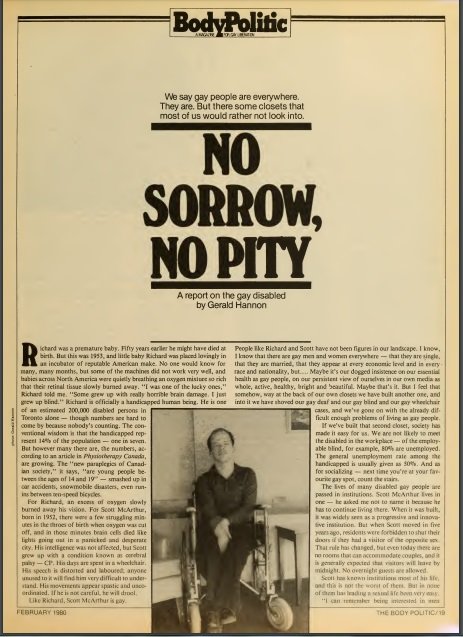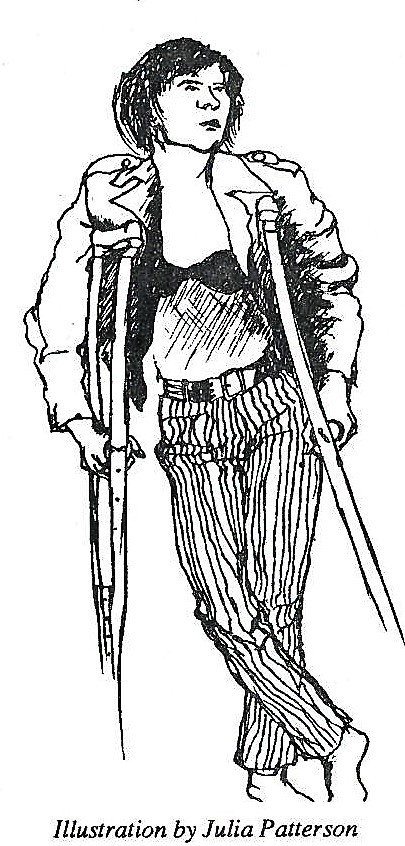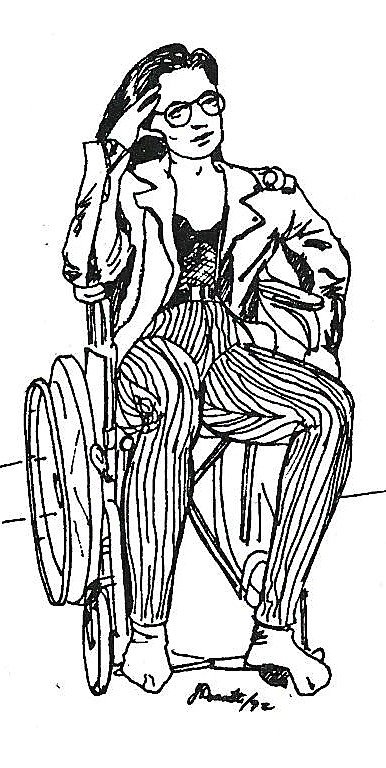In February 1980, the Body Politic released an article discussing the challenges that gay-identifying disabled people, encounter. In the article, the author, Gerald Hannon, emphasises the exclusion of people with disabilities within gay spaces. As he illustrates, the voices of LGBTQ2+ individuals who experience disability, are constantly forced to navigate spaces where disabled bodies are not imagined to occupy.  Even within Toronto’s gay spaces, Hannon writes: I know, I know that there are gay men and women everywhere-that they are single, that they are married, that they appear at every economic level, every race and nationality, but…maybe it’s our dogged insistence on our essential health as gay people, on our persistent view of ourselves in our own media as whole, active, healthy, bright and beautiful. Maybe that’s it. But I feel that somehow, way at the back of our own closets, we have built another one, and into it we have shoved our gay deaf and our gay blind and our gay wheelchair cases, and we’ve gone on with the already difficult problems of living as gay people. (p. 19). Often, when people with disabilities are imagined occupying intimate spaces, they experience an asexualization which renders people with disabilities as bodies incapable of intimacy. In a two-day conference hosted by DAWN-RAFH in 1992, titled “Women, Sexuality and Disability: Peeling Off the Labels” , the organization sought to challenge (mis)representations of sexuality and disability, and how failure to include disabled women in conversations of sexuality and disability stigmatizes disabled women’s right to sexual autonomy. This conference hosted talks from Joanne Doucette, Darien Taylor, Rafia Haniff and Joy Isaac, and Shelley Tremain. Joanne Doucette’s discussion focused on body image and how to reclaim and transform conventional (ableist) standards of beauty and aesthetics. She also screened the film “Toward Intimacy” (1992) by Debbie McGee, which chronicles the lives of several women with disabilities in Canada, as they seek intimate relationships. This is significant because not only did she give a platform for women with disabilities to seek recognition but also validate the experience of women with disabilities in Canada.
Even within Toronto’s gay spaces, Hannon writes: I know, I know that there are gay men and women everywhere-that they are single, that they are married, that they appear at every economic level, every race and nationality, but…maybe it’s our dogged insistence on our essential health as gay people, on our persistent view of ourselves in our own media as whole, active, healthy, bright and beautiful. Maybe that’s it. But I feel that somehow, way at the back of our own closets, we have built another one, and into it we have shoved our gay deaf and our gay blind and our gay wheelchair cases, and we’ve gone on with the already difficult problems of living as gay people. (p. 19). Often, when people with disabilities are imagined occupying intimate spaces, they experience an asexualization which renders people with disabilities as bodies incapable of intimacy. In a two-day conference hosted by DAWN-RAFH in 1992, titled “Women, Sexuality and Disability: Peeling Off the Labels” , the organization sought to challenge (mis)representations of sexuality and disability, and how failure to include disabled women in conversations of sexuality and disability stigmatizes disabled women’s right to sexual autonomy. This conference hosted talks from Joanne Doucette, Darien Taylor, Rafia Haniff and Joy Isaac, and Shelley Tremain. Joanne Doucette’s discussion focused on body image and how to reclaim and transform conventional (ableist) standards of beauty and aesthetics. She also screened the film “Toward Intimacy” (1992) by Debbie McGee, which chronicles the lives of several women with disabilities in Canada, as they seek intimate relationships. This is significant because not only did she give a platform for women with disabilities to seek recognition but also validate the experience of women with disabilities in Canada. 
 In a conversation facilitated by Darien Taylor, titled “The Voices of a Positive Woman”, she discussed the intersection between disability, HIV positivity and gender. As a founding member of “Voices of Positive Women” (an organization which seeks to empower women who are HIV positive), Taylor highlighted the difficulty of navigating life, regarding issues in finding employment, facing a medical field that is still largely uninformed regarding how to best help HIV positive women. In Raffia Haniff and Joy Isaac’s workshop “Culture and Disability: How Do These Impact Sexuality?” they facilitated a discussion regarding how they personally navigate life as disabled women of color and how they balanced their own cultures’ attitudes toward sex and disability. Finally, in Shelley Tremain’s talk “Creating Our Own Images”, she emphasised the importance of recognizing the desires of disabled women in representation. She believes that disabled women must create those images in order to deflect the depictions of disabled women by the dominant ableist culture, which (still) portrays disabled women as feeble, largely asexual, feminine and naïve. She suggests that in order to experience a sexualization of their identity, disabled women must exaggerate their femininity. Instead, she underscores the need to create a feminist disability culture. Articles and conferences like the Body Politic and DAWN-RAF were crucial cornerstones in the fight for sexual recognition of people with disablities. Although the issue of sexual legitimacy remains, by creating space for conversations like these to take place and giving access to materials regarding sexual health across a wide variety of disabilities, these opportunities act as processes of knowledge-making through validation, cooperation and understanding. Both the issue of the Body Politic and transcript of the conference featured are available at 34 Isabella Street. If you would like to find out more about sex and disability, or work with these materials, send us an email at queeries@arquives.ca. Written by: Shayla Sabada, The ArQuives Intern
In a conversation facilitated by Darien Taylor, titled “The Voices of a Positive Woman”, she discussed the intersection between disability, HIV positivity and gender. As a founding member of “Voices of Positive Women” (an organization which seeks to empower women who are HIV positive), Taylor highlighted the difficulty of navigating life, regarding issues in finding employment, facing a medical field that is still largely uninformed regarding how to best help HIV positive women. In Raffia Haniff and Joy Isaac’s workshop “Culture and Disability: How Do These Impact Sexuality?” they facilitated a discussion regarding how they personally navigate life as disabled women of color and how they balanced their own cultures’ attitudes toward sex and disability. Finally, in Shelley Tremain’s talk “Creating Our Own Images”, she emphasised the importance of recognizing the desires of disabled women in representation. She believes that disabled women must create those images in order to deflect the depictions of disabled women by the dominant ableist culture, which (still) portrays disabled women as feeble, largely asexual, feminine and naïve. She suggests that in order to experience a sexualization of their identity, disabled women must exaggerate their femininity. Instead, she underscores the need to create a feminist disability culture. Articles and conferences like the Body Politic and DAWN-RAF were crucial cornerstones in the fight for sexual recognition of people with disablities. Although the issue of sexual legitimacy remains, by creating space for conversations like these to take place and giving access to materials regarding sexual health across a wide variety of disabilities, these opportunities act as processes of knowledge-making through validation, cooperation and understanding. Both the issue of the Body Politic and transcript of the conference featured are available at 34 Isabella Street. If you would like to find out more about sex and disability, or work with these materials, send us an email at queeries@arquives.ca. Written by: Shayla Sabada, The ArQuives Intern

